Chinese Scallion Oil Is The Mother Sauce You Need To Know
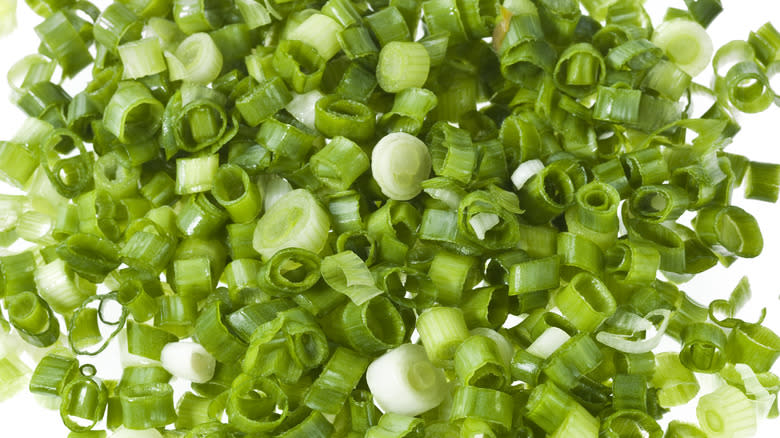
Scallions: You may love them or hate them, but they have more to offer than just being thinly sliced and used as a garnish. Not that there's anything wrong with that — think of the way their subtle allium punch and thin crunch can accent a plate of noodles or brighten a plate of grilled meat. Now imagine if you could harness their characteristics, accent them, and take them to new heights. Luckily, there is already an ingredient that does that — a cherished member of the Chinese culinary pantheon that is easy to make and forms the basis for a range of other sauces. For all these reasons, humble scallion oil should be in your repertoire.
This seemingly simple condiment conceals a world of flavors within its unassuming green depths — the alchemy of the subtle allium and neutral oil unlocks and transports flavors across the palate. Unlike infusions such as herb oils, scallion oil is steeped, which coaxes out of the thin bulb a mild, pleasant sweetness and nuttiness not found in raw scallions. By the same turn, any harsh notes from the scallion are tempered into an oil that is mellow yet vibrant, making it a solid choice whether you need a flavorful cooking oil or you're whipping up a batch of your favorite Chinese-inspired sauces.
Read more: How Long Do Condiments Last?
What Is Scallion Oil?
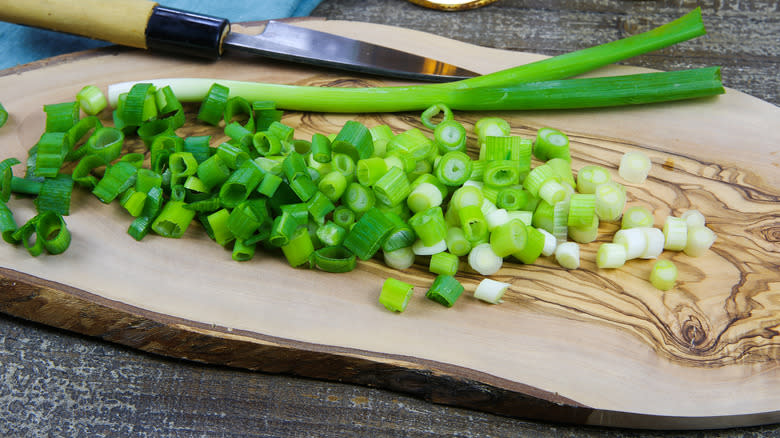
At its base, scallion oil is a neutral vegetable oil that has been steeped with finely diced scallions. During the low-temperature steeping process, the scallions exude their essence into the oil and acquire a subtle nuttiness. The oil is then strained or can be left as is with the toothsome bits of scallion included for mouthfeel. (If you're making your own strained oil, don't toss those bits of scallion — they can be used as a crispy topping for everything from salads to baked potatoes.)
It should come as no surprise that scallion oil is a staple in China and elsewhere in Asia. Scallions are native to the continent and have been cultivated there since at least 3500 B.C. They have been used in cooking, of course, but also as an integral part of traditional Chinese medicine — their antimicrobial properties make them a good additive for poultices used to clean and disinfect wounds. Traditional herbalists also believe that eating scallions helps support the urinary system and improves the strength of the immune system.
Scallions are also part of what some call the "holy trinity" of Chinese cooking along with garlic and ginger. The three aromatics are employed throughout the vast, varied Chinese culinary canon, and scallion oil itself is a key ingredient in everything from dan dan noodle sauce to stir-fried dishes. Similarly, you'll find other regional versions of scallion oil, such as Vietnam's Cách Làm Mỡ Hành, in many other Asian cultural cuisines.
How Is Scallion Oil Made?
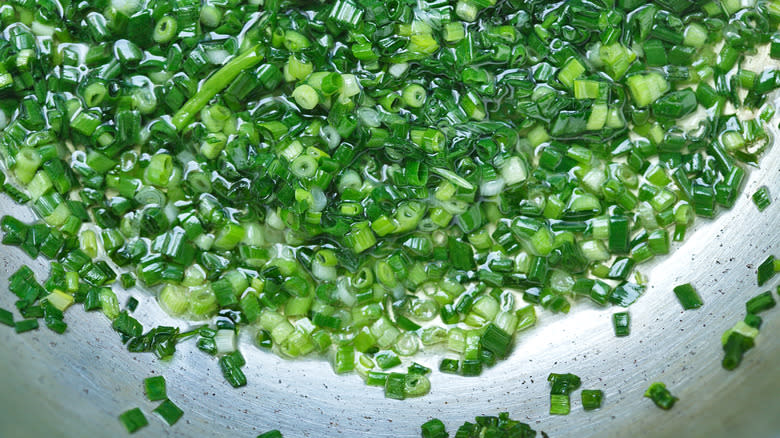
Crafting scallion oil is a fairly easy task that you'll likely find rewarding and worth the effort, should you have the time to go through the process. To embark on this adventure, gather fresh scallions, your choice of cooking oil — commonly, peanut or vegetable oil — and a pinch of salt. Begin by finely chopping the scallions, then heat the oil in a pan over low heat until it shimmers. Add the scallions and a dash of salt, allowing them to sizzle until they turn a glorious shade of golden brown. Strain the aromatic liquid and either discard the remnants or leave them in for an extra bite.
If the solids are left in, the scallion oil will keep in a sealed container in the fridge for about two weeks. If strained and stored properly in an airtight jar, the oil can be kept for anywhere from a month to three months. However, it's important to note that the scallion oil will lose potency over time. That's not to say that it will necessarily turn rancid — but the punchy scallion flavor will deliver diminishing returns as time passes.
Once you've mastered the art of crafting it, you can use scallion oil as a versatile canvas to create an array of culinary masterpieces. Elevate your scallion oil by infusing it with additional ingredients like ginger, garlic, or Sichuan peppercorns to craft unique variations that cater to your palate's desires.
What Does Scallion Oil Taste Like?

Scallion oil is an ode to allium goodness. This condiment is for the onion, leek, garlic, and, yes, scallion lovers out there — as maligned as they are by some, they are an integral part of many dishes, so it's understandable why they work when infused in such a way. While other infused oils carry the floral essence of fresh herbs or the zip of chili peppers, scallion oil belongs to its own class along with Mexican mojo de ajo (garlic oil) and Japanese negiyu (leek oil).
The scallions contribute a sweet, slightly nutty essence, while the oil imparts a silky, luxurious texture. Together, they create a harmonious blend of umami, with a subtle hint of onion pungency. While you probably wouldn't want to drink scallion oil straight — though we're not here to judge you if you do — it amplifies flavors and offers a delightful bit of depth and contrast, especially when used in sweet or tart sauces. Drizzle it over your dishes, and you'll experience an explosion of savory goodness that harmonizes with a myriad of cuisines.
Scallion Oil Vs. Chili Oil
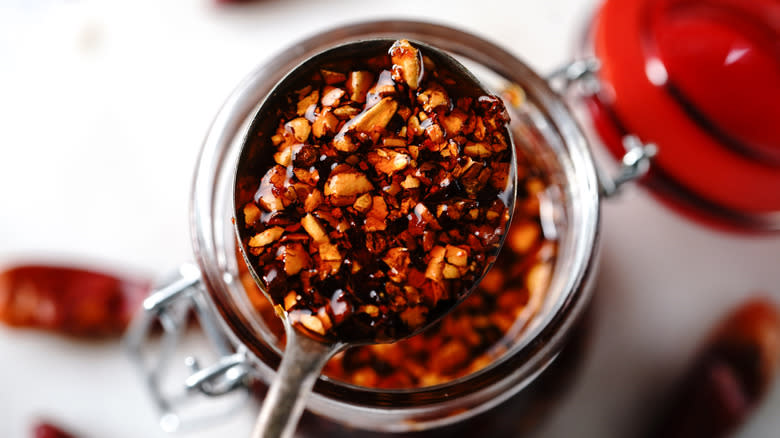
In the realm of Chinese condiments, scallion oil and chili oil are two that are seemingly similar — both used in many sauces and as flavor-enhancing garnishes — yet they're worlds apart in terms of what they bring to the table. Scallion oil embraces subtlety and depth, a warm hug to your taste buds. It is not meant to dominate a dish, but rather to add a layer of flavor that carefully melds with its incumbent tastes.
In contrast, chili oil — as one would expect from its defining ingredient — brings the heat, igniting your senses with fiery spiciness. Chili oil comes to dominate the food it is served with in much the same way as American hot sauces do. It adds edge to dishes that might feature a more subtle baseline flavor that can serve as a canvas for chili oil's assertiveness. Scallion oil is your steadfast companion, adding depth and richness to your dishes, while chili oil boldly demands attention. The choice between the two often hinges on the dish at hand or your personal inclination for warmth or fire.
How To Use Scallion Oil
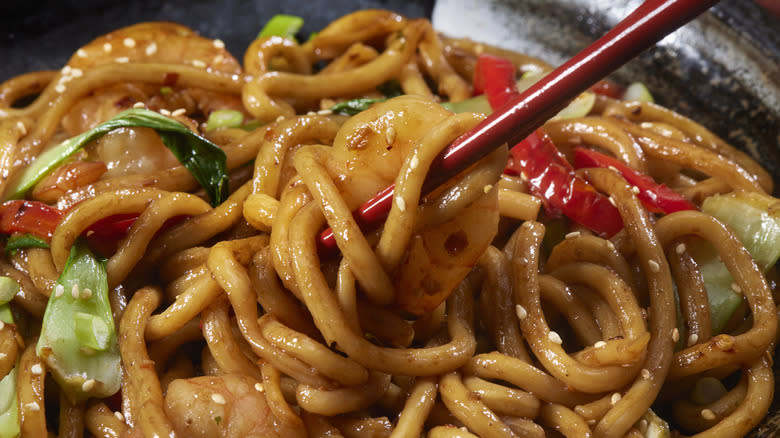
Scallion oil can be more than just a flavorful condiment; it's a versatile kitchen companion that elevates culinary creations. For instance, scallion oil makes for a quick and easy stir-fry or noodle bowl sauce. Simply blend it with soy sauce and a touch of sugar for a savory, umami-rich sauce.
If you're steaming fish or vegetables, consider using scallion oil as the perfect aromatic companion. Drizzle a spoonful over your steamed dish just before serving. The heat will coax out its delightful fragrance, infusing your steamed creations with a subtle, savory note that enhances their natural flavors.
Scallion oil also makes a superb base for salad dressings. Whisk it together with a bit of vinegar, soy sauce, and a touch of honey or sesame oil for a well-balanced dressing that pairs beautifully with mixed greens, crispy vegetables, or even a noodle salad.
Just remember that scallion oil, whether used as a condiment in its own right or an addition to a sauce or dressing, is an accent — a flavor enhancer. It is not an oil for sautéing or frying, where the intensity of the heat would only serve to mask the inherent flavors. While it wouldn't ruin a dish — it's still neutral vegetable oil at its base — it would be a waste of such a flavorful ingredient to use it in such a way.
Where To Buy Scallion Oil

While creating your own scallion oil can be a gratifying culinary endeavor, it's also readily available in many Asian grocery stores and online retailers. When opting for pre-made versions, seek out trusted brands or artisanal options to ensure the quality of your scallion oil. These convenient alternatives allow you to savor the oil's flavors without the hassle of preparation, making it an easy choice for both seasoned cooks and novices alike.
Of note, as chili crisp and crunchy garlic oils have surged in popularity in recent years, you may find scallion oils or oils that contain scallion along with other items that don't exactly fit the bill of the scallion oil we've been discussing. These other options will likely have crunch or crisp in the name or, at the very least, in the description. There's nothing wrong with these oils and they can be quite delightful in their own right, but the texture and deeper flavor make them quite a bit different from the more delicate scallion oil that you would use in more traditional sauce recipes.
Nutritional Benefits Of Scallion Oil
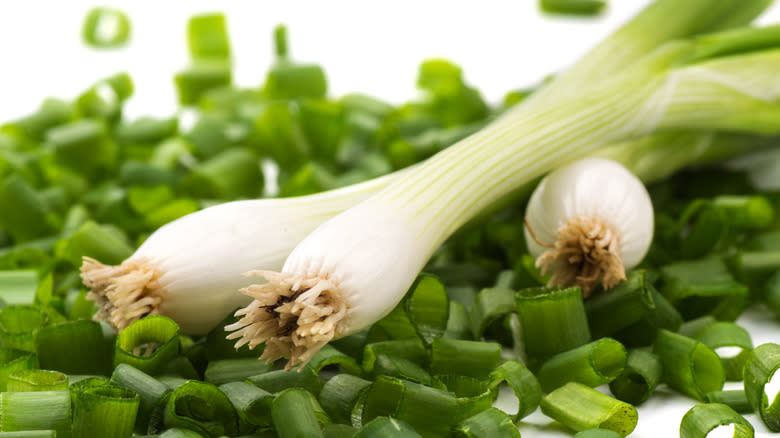
Aside from the role scallions have played in traditional Chinese medicine, scallions themselves possess a number of health benefits and essential nutrients. For strong bones and to prevent blood clots, humans need vitamin K, and scallions have that in spades. In fact, a cup of scallions contains twice the daily recommended amount along with significant amounts of antioxidant vitamin C and DNA-building folate, per WebMD. Plus, they have zero cholesterol, almost no fat, and minimal carbohydrates and sugar.
But we're not just talking about scallions here. The oil component contributes a significant amount of calories — but remember that scallion oil is used in relatively small quantities, so the calories you're consuming are comparable to that of other oil-based condiments and sauces, such as herb oils and chili crisps. Additionally, there is some research that points to benefits that come from cooking vegetables in oil. As there is no water used in the cooking, water-soluble nutrients remain intact within scallions, which is a plus for cooks who choose to leave them in their scallion oil. Evidence also points to oils and fats actually being beneficial in how the human body absorbs certain nutrients, such as the beta-carotene found in carrots (per the British Journal of Nutrition). So while it is important to remain cognizant of the calories in scallion oil, you can rest easy knowing that the nutritional value of the scallions therein remains largely intact.
Read the original article on Tasting Table.

